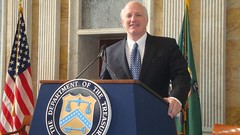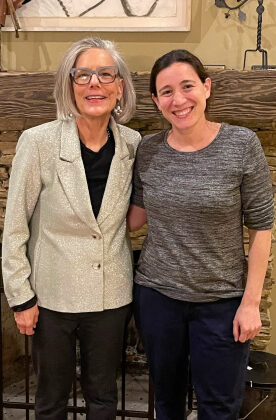
The New Year is off to an inspiring start, and 2012 promises to be a busy year for HBE and HBE’s CEO Perry Hooks. “January’s themes were leadership, trust, risk, vulnerability and how history repeats itself,” Hooks said. “All of these themes came together in an amazing sort of way.”
On January 10, Steve Fenberg shared his biography, Unprecedented Power: Jesse Jones, Capitalism & The Common Good, with Treasury Department officials. Fenberg discussed the Reconstruction Finance Corp., a federal agency created to lend money during the Great Depression and expanded by Jones as Secretary of Commerce under FDR. The parallels between RFC and today’s Troubled Asset Relief Program (TARP) are unmistakable, which is why Timothy Massad, Treasury’s Assistant Secretary for Financial Stability, “loves the book,” Hooks said. Massad is responsible for overseeing the implementation and wind down of TARP. “This book shows that it has all been done before, it is history repeating itself, and in fact, that RFC probably went further than TARP. It is always a good idea for today’s leaders to look back at what other leaders have done to solve similar problems.”
On January 17 and 18, two events featured health care legislation expert Jonathan Gruber speaking about his book, Health Care Reform: What It Is, Why It’s Necessary, How It Works. “Gruber is a really smart, energetic proponent of the Obama health care reform legislation…he helped to write it,” Hooks said. “If you are curious about health care reform legislation, this is the book for you. It is in comic book form, so it’s an easy read, and chock full of great information.”
 Also on January 18, Robert Hurley, author ofThe Decision to Trust “hit a real nerve, a real chord, talking about trust in the workplace,” Hooks recounted. “He has already been asked back. He will be here for four events in March, and he may have some room in his schedule” for additional events. “Hurley’s message is that if it is not a trustworthy environment, the workplace is greatly diminished. Also, that as individuals in the workplace, we need to be more careful about whom we trust.” Hooks noted Hurley’s reference tying his ideas to those of Daniel Kahneman, author of Thinking, Fast and Slow, who spoke at a December 7 HBE event. “His point is that if you think too fast, you may trust someone you shouldn’t. Think slow, don’t trust too fast. Don’t be a victim.”
Also on January 18, Robert Hurley, author ofThe Decision to Trust “hit a real nerve, a real chord, talking about trust in the workplace,” Hooks recounted. “He has already been asked back. He will be here for four events in March, and he may have some room in his schedule” for additional events. “Hurley’s message is that if it is not a trustworthy environment, the workplace is greatly diminished. Also, that as individuals in the workplace, we need to be more careful about whom we trust.” Hooks noted Hurley’s reference tying his ideas to those of Daniel Kahneman, author of Thinking, Fast and Slow, who spoke at a December 7 HBE event. “His point is that if you think too fast, you may trust someone you shouldn’t. Think slow, don’t trust too fast. Don’t be a victim.”
The themes of trust and victimization led right into another January 18 event, at the Spy Museum, where Joel Brenner discussed his book America the Vulnerable, New Technology and the Next Threat to National Security “Brenner is quite dapper, highly intellectual, a really smart guy, a former NSA insider,” Hooks detailed. “Brenner’s message is that there is so much information out there it is hard to know who and what to trust. It is our responsibility not to be a victim. Justice got hacked. I was attacked this week as a Zappos customer. As individuals, the U.S. government, employees of corporations, we are all vulnerable to these attacks.” Zappos CEO Tony Hsieh, coincidentally an author HBE has worked with, responded quickly to let customers know how to safeguard their e-mail accounts, Hooks added. Brenner will be back for another event in March.
“All of this relates in an odd sort of way,” Hooks said of January’s speakers and themes. “We are connecting the dots from history and leadership to trust, risk and behavioral economics. What keeps me going is the knowledge that new ideas help to fix problems; new ideas enhance whatever you are thinking about.”
Looking ahead, February and March should be just as interesting. Among the upcoming highlights: author Elizabeth Dowling Taylor will discuss her book, A Slave in the White House: Paul Jennings and the Madisons in February, which is Black History Month, and Stephen M. Shapiro, Best Practices are Stupid: 40 Ways to Out-Innovate the Competition will be featured at several events in February, March and April.

